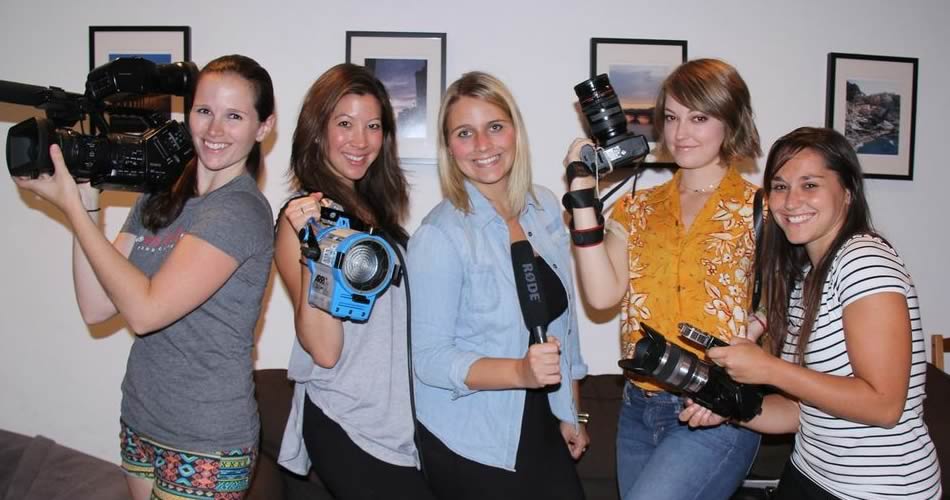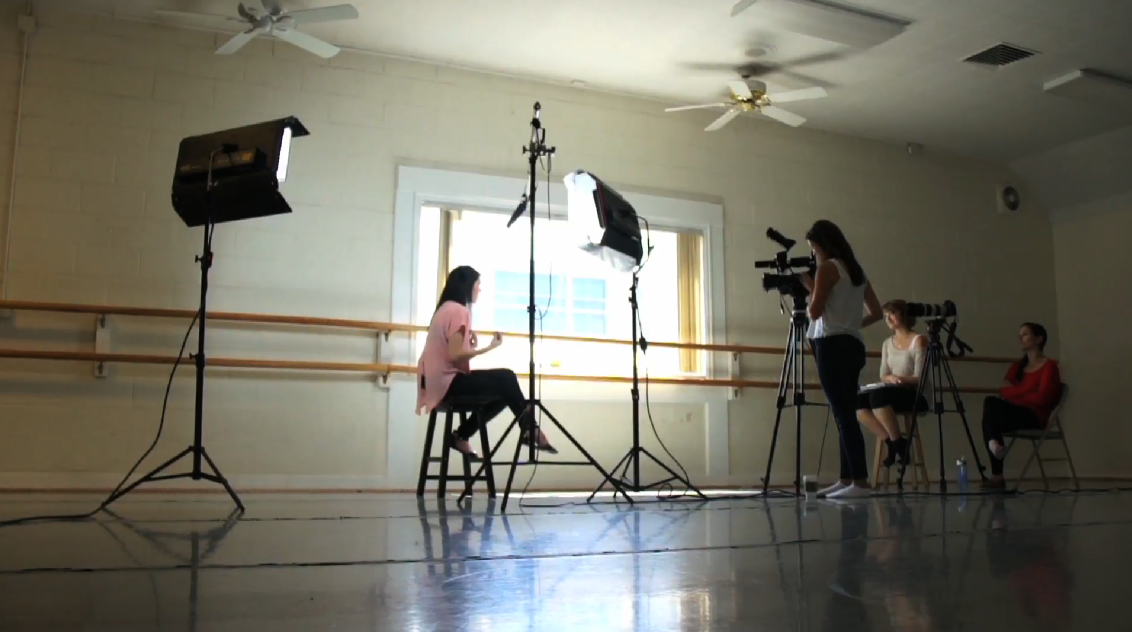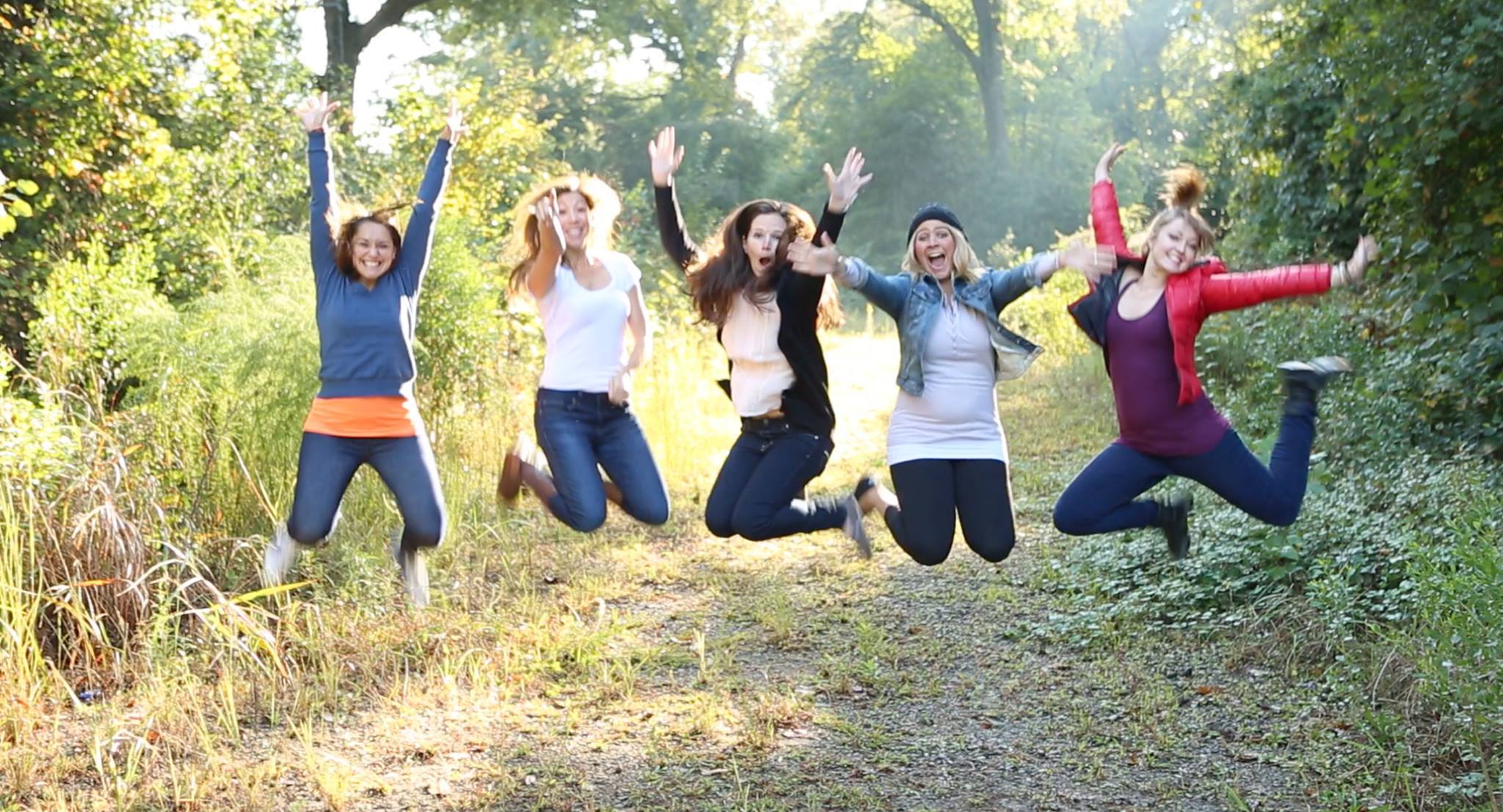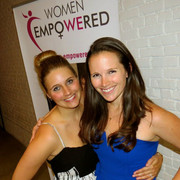Director Sarah Moshman and Co-Producer Ashley Hammen dish on the making of the documentary, The Empowerment Project.
Last month Catherine and I had the pleasure of attending a screening of the female driven documentary, The Empowerment Project: Ordinary Women Doing Extraordinary Things. The film seeks to answer the time-tested question, “What would you do if you weren’t afraid to fail?”. For Sarah Moshman and her crew of female filmmakers, the answer was easy. It was the creation of this project.
Over the course of 30 days and 7,000 miles, these women hit the road to interview 17 women in leadership. From ballerinas to brew masters, they interviewed women in industries as varied as they come, all the while negating stereotypes of what it means to be a women in charge.
As far as we think we’ve come, the truth is that we still have a long way to go to accepting powerful women as the norm. The Empowerment Project seeks to see that change by sparking conversation about what it means to be a successful woman and what it takes to join the ranks. Needless to say, we wanted in on the conversation.
For the latest installment in our Brunches with the Best series, I sat down with Sarah Moshman the film’s director and Ashley Hammen one of the film’s co-producers to find out more about the making of the film, what they hope to see it accomplish, and the advice they’d offer to our Single Girls.
Q: Let’s start off by learning a bit about each of you. You both call LA home now but where did you each grow up and what brought you both to the West coast?
Sarah: I grew up in Evanston, Illinois. When I was 13 when my dad brought me out to LA to see a taping of Boy Meets World. It was from that trip on that I knew I wanted to live here. After college graduation, I finally got my chance when I was offered a job to be a story assistant for Dancing with the Stars.
Ashley: I’d never had ambitions to move to Los Angeles. In fact, I’d had a summer internship in NYC and thought that’s where I’d end up after college graduation. I was then offered the chance to move to LA to fill a role as the assistant to a director I’d been working with on an independent film being shot in my hometown in Iowa. I decided to take the leap and move to the west coast. It was definitely a big transition for me but I began to love living here more and more as I found my footing and found great career opportunities working with Ellen Rakieten at Relativity Media.
Q: So you both have backgrounds working in reality TV. What inspired you to make The Empowerment Project?
S: In late 2012, I had this general awaking to the fact that if we didn’t have positive female role models to admire, to look up to, to serve as role models, then we would never be able advance as women. I was feeling this itch that I needed to do something when I read Sheryl Sandberg’s book Lean In. Her quote, “What would you do if you weren’t afraid to fail?” really stuck with me.
At that point, I’d produced two other short female empowerment focused documentaries with my business partner Dana. While they had both done well, what I really wanted to do was direct a feature film. It was also at this time that I realized no one was going to hand me that opportunity and that if I wanted it, I was going to have to do it for myself.
The Empowerment Project was born out of a combination of these things– the frustration with the media landscape, reading Lean In, and the want to direct my own feature film. I called Dana (my business partner) and we decided to go for it. We had no idea what we were in for.
A: As soon as I was introduced to the project I knew I wanted to help out however I could. I started attending events to help promote the KickStarter campaign Sarah and Dana were running to raise money to create the film. One morning, they asked to meet for breakfast and surprised me by asking if I would join their crew. At the time, I was working in casting for a reality show and realized that I wasn’t proud of the work that I was doing. I knew I needed a change so I jumped on board.
Q: In addition to the three of you, the rest of the crew was also all female. Why was that important?
S: It was really important to us to have an all female crew to best allow the women we were interviewing to open and tell their stories. I haven’t chosen to make the fact that only women worked on the film a big deal because I don’t want that to be the focus of the conversation around the film. It was also important because part of what we wanted to do while were creating the film was to offer mentorship opportunities along the way. In every city we recruited 1-2 young women to join the crew and be involved in the process. We really valued the chance to use the creation of the film to empower women and be part of the change we want to create.

Q: What kinds of reactions were you met with when you decided to embark on this journey? Were you met with support or skepticism?
S: A bit of both. Everyone was supportive of what we wanted to do but as it is with any big undertaking, people were worried for us. I don’t think anyone quite understood what we were trying to do.
A: There were so many people who felt like we were rallying on this feminist protest across the US. When really, we just wanted to go on this amazing journey and to be able to share the stories of these women.
Q: You interviewed 17 women along the way. Can you talk more about what impact you hope to make by sharing their stories?
S: The tagline of the film is Ordinary Women Doing Extraordinary Things and that’s really what is at the heart of our mission. The purpose of creating the film is to spark conversation among people of all ages and genders around society’s portrayal and perception of women. We want to change the unconscious acceptance of what’s the norm.
We particularly have a passion for sparking that conversation with kids because that’s how society’s perceptions will ultimately begin to change. A large part of what were doing to rollout the film across the US is to host screenings at schools. We think it’s important to show kids from a young age that women can be strong and powerful.
A: We want to start to see strong, dynamic female characters in the media as the norm. In order for that to happen, we need to help start a conversation that audiences can rally behind. The public has the power to make a change, especially by expressing their opinions via social media. If you believe in the message we’re spreading with The Empowerment Project it’s important to share that. When audiences begin asking for more positive programming, advertisers, and ultimately entertainment creators will respond.

Q: That’s a powerful mission to be on. There must have been women in your own lives who served as strong positive role models.
A: Absolutely–I grew up in a family of very positive female role models. I was surrounded by all these amazing women who never let me believe that anything was impossible. They taught me to work hard and go after my dreams. I always knew that if I failed there would be a bunch of loving arms there to support me and push me back on my feet.
S: My mother was definitely a role model for me. Society will always try to tell you you’re not good enough in some way but my mom never made me feel that way. She never said anything bad about herself and now that I’m older I can really appreciate that. Growing up in that kind of environment helped me be confident in myself and to not be afraid to go after my goals. As important as female role models are to me, it would be remiss not to also mention my dad. He taught me how to use my first camera and set the foundation for me to be a filmmaker. He also taught me to expect nothing less than excellence in myself and in my work. Beyond that, I love Sheryl Sandberg, Mindy Kaling, Amy Poehler, Amanda de Cadenet. I feel like they are using their platforms for good and are contributing to the same conversation that we are part of.
Q: The hope is that everyone who sees this film walks away having learned something. What have been the biggest lessons you’ve taken away from this journey?
A: I think we all took away the importance of support and the power of asking for help. Personally the trip made me realize how much good there is everywhere. So many people along the way were willing to help from paying for our lunch to giving us a free place to stay. They felt that by helping us they were part of this big mission we were on. It was such a reminder that there is so much good in the world.
S: For me, it’s that we are all capable of so much more than we can ever imagine. To just let yourself see what you can do is a beautiful thing. Most people are too afraid to execute on their dreams. Why not just say yes?
Q: I think we agree that fear of failure is one of the biggest obstacles women struggle with. How do you overcome that?
S: It’s all about how you define failure. I’ve realized that the person who would be most disappointed if I didn’t succeed would be me. We are our own biggest critics. These women taught us that their failures are what helped make them successful. Recognize that failure is a lesson and is just another part of life.
A: I don’t think people realize why they are afraid of failure. Sometimes success is just as scary.

Q: What’s next?
S: While we were on the road, we became very aware that we weren’t just creating a project. We were creating a movement. We would love to do this again and again in many different forms. There’s an endless cast of women out there we could interview and a limitless audience to reach. We’re very excited to see how this will evolve and grow. We’ve thought about interviewing women in each of the cities where we hold a screening and turning it into a web series. We’ve also talked about expanding internationally and helping women in different countries create their own version of the film. We just want to see the conversation continue.
A: It’s the best gift to get to watch other people watch the film and to see what touches them. Each person has a different experience with the film. It’s powerful to see their responses, how they’re connecting, and how it’s changing them.
Q: What advice would you offer to Single Girls wanting to pursue their passions?
S: I would say to ask yourself, “what is the mark I am going to leave on the world”. We all want to be able to stand next to our accomplishments and be proud. Be bold and naive. That’s the best way to think of any situation. If we would have known how hard creating this film was going to be, we probably wouldn’t have done it. If you want to do something, just do it and don’t think about how hard or scary it’s going to be.
XO
Jen
 To watch the trailer for The Empowerment Project and learn more about how to bring the film to your community go to: http://indieflix.com/
To watch the trailer for The Empowerment Project and learn more about how to bring the film to your community go to: http://indieflix.com/




























